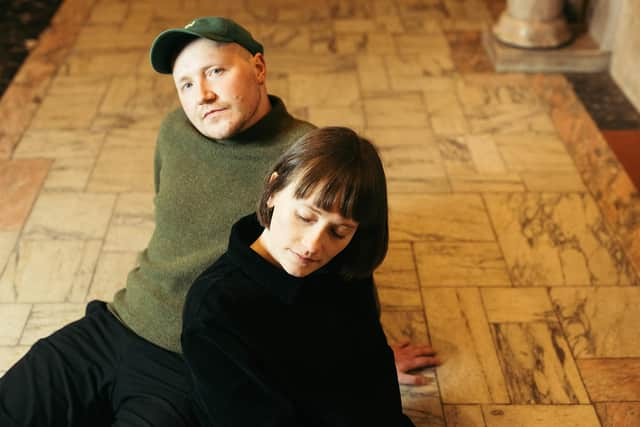Album reviews: Erland Cooper | Cloth | Alison Eales


Erland Cooper: Folded Landscapes (Mercury KX) ****
Cloth: Secret Measure (Rock Actions Records) ***
Alison Eales: Mox Nox (Fika Recordings) ****
London-based composer Erland Cooper may live far from his native Orkney but he remains close creatively, producing a trilogy of albums inspired by the islands’ ecosystem and burying another album recording in a secret location there, with treasure hunt clues to solve. Now that the tape has been discovered and retrieved, this solitary copy is happily touring the record shops of the nation in the run-up to its one live outing next year at the Barbican.
Cooper was also commissioned to write the music to accompany the Platinum Jubilee Superbloom display at the Tower of London so it’s no lip service when he describes the natural world as his “collaborator”. Now he casts his net even wider to look at global warming and the climate crisis, with some proceeds from his new album going to Brian Eno’s EarthPercent charity.
Advertisement
Hide AdAdvertisement
Hide AdHis human collaborators on Folded Landscapes are the members of the Scottish Ensemble who were put through their paces, recording the music in fluctuating temperatures from sub-zero to sweltering. The result is a climate change meditation in seven movements with elemental field sounds of fire, ice and water and recorded and sampled voices including poet Simon Armitage and climate activist Greta Thunberg.
The first part of Movement 1 – a lamentation for strings – opens with lapping waves against a boat and closes with the sound of a cassette player. That stop/start sensation is echoed in the more urgent eddying of Pt.2.


The romantic swell of Movement 2 forms the backdrop to Armitage’s sober intonation, but there is a lightness as he notarises small beauties and soprano Josephine Stevenson gives his words wings. Movement 4 features a steady recitation of Scottish islands and other locations which revels in the musicality of the names, then jumps over the Irish sea to other poetic Celtic destinations.
The temperature rises in Movement 5 with fragrant vocals, languorous strokes and overlapping vocal samples, particularly the voices of the next generation asking us to be responsible stewards. The folk-influenced strings and harmony vocals of Movement 6 were recorded in a toastier recording studio and Movement 7, featuring Cooper’s minimal, melancholic piano and Leo Abrahams on guitar, is accompanied by the sizzling drone which resulted from the tape being left to bake on the roof of Cooper’s studio on the UK’s hottest day on record. Point taken.
Twins Rachael and Paul Swinton made a mellow splash with their 2019 debut album as Cloth. Its follow-up may be one of the quietest, gentlest albums released by their new label – Mogwai’s Rock Action Records. Secret Measure almost dares the listener to blink first. The action here involves Rachael’s rather one-note breathy alto accompanied by a delicate but dynamic palette of instruments, from brooding guitar on the title track to Jemima Coulter’s lonesome trumpet on Lido and the iridescent chimes of Blue Space. The smooth 80s production feel of Pigeon is complemented by Never More, a track which evokes the understated luxury of late Roxy Music.
Glasgow-based singer, songwriter and multi-instrumentalist Alison Eales is a member of indie ensemble Butcher Boy and enchanting choral group the Madrigirls but her debut solo album Mox Nox (meaning “night, shortly”) is an opportunity to hear her light, pure voice in its own right across a variety of ravishing soundscapes, from the electronica-inflected indie folk of Rapunzel to the delicate chamber pop of Ever Forward, with string quartet arrangement by Pete Harvey of Modern Studies. Half-French Kiss is a fragile dispatch played on a music box while the mellow electro pop of Through Hoops is graced with lovely improvised fluttering flute from Diljeet Kaur. Eales ends the album by considerably upping the bpm on Come Home With Me, but still keeps it sweet.


CLASSICAL
Karim Sulayman and Sean Shibe: Broken Branches (Pentatone) ****
Advertisement
Hide AdAdvertisement
Hide AdThere’s an abundance of soul-searching in this thoughtfully creative collaboration between Lebanese-American tenor Karim Sulayman and guitarist Sean Shibe. Their respective backgrounds – Edinburgh-raised Shibe has an English father and Japanese mother – are reflected in a fascinating musical conversation among far-reaching traditions. Yet it’s Broken Branches’ cross-fertilisation that is most interesting, spiced flavourings in two Monteverdi arias just as exotic as, say, the traditional Sephardic love song La prima vez. And this is not a disc to explore for its differences, rather a listening experience promoting a global cultural synthesis. From John Dowland’s ruminative Time Stands Still to the mystical charm of Lebanese composer Layale Chaker’s A Butterfly in New York, Jonathan Harvey’s Sufi Dance and Takemitsu’s evocative In the Woods (both exquisite guitar solos), the mix is stimulating. If an overriding sense of restraint prevails, Britten’s effervescent Songs from the Chinese offer a lustrous awakening. Ken Walton
FOLK
Ímar: Awakening (Big Mann Records) ****
They’ve titled their third album Awakening, but it’s hard to imagine the Scots-Manx-Irish quintet Ímar ever sleeping, as they hit the ground running once again. Playing mainly their own compositions, concertina wizard Mohsen Amini, fiddler Tomás Callister, flautist and uilleann piper Ryan Murphy, Adam Brown on bodhrán and guitar and Adam Rhodes on bouzouki deftly juggle dazzling speed, cohesion and split-second timing. An exhilarating opening set of supercharged reels, Bangers, is heralded by galloping bodhrán and snappy guitar chording before concertina, fiddle and pipes take up the chase. The following jig trio, Splinter O’Neil, is pursued with similar brio, although pace relaxes for Waterhorse and the shadowy advance of Beaton's March. Gift Horse skips along with a fine lightness while Callister’s eloquently anthemic Imagine A World is as near to a slow air as they get, before cranking up the energy again while maintaining a persuasive freshness. Jim Gilchrist